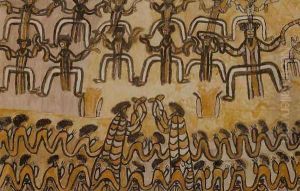William Barak Paintings
William Barak was a significant figure in Australian art and history, born into the Wurundjeri-willam clan in 1824 near present-day Melbourne in the state of Victoria, Australia. As a respected elder, artist, and social justice advocate, Barak played a pivotal role in bridging the gap between Indigenous Australian cultures and European settlers during a time of great upheaval and change. His contributions extend beyond art, encompassing his efforts to protect the rights and culture of his people in the face of colonization.
Barak's life spanned a period of intense conflict and transformation in Australia. After witnessing the impacts of European settlement on his homeland from a young age, he became a key figure in the struggle for Aboriginal rights and land. He was known for his leadership at Coranderrk Reserve, a self-sustaining community for Indigenous people, where he fought tirelessly for its independence and sustainability against government pressures to close it. His advocacy work is remembered as a crucial chapter in the history of Indigenous resistance in Australia.
As an artist, William Barak is renowned for his ceremonial and historical works, which provide invaluable insights into the cultural practices, social structures, and spiritual beliefs of the Wurundjeri people. His drawings and paintings often depicted traditional ceremonies, daily life, and encounters with Europeans, rendered in a distinctive style that combines both Indigenous and European artistic elements. Through his art, Barak communicated the richness of Aboriginal culture and its resilience in the face of colonization. His works are considered some of the most important records of Indigenous culture from this period and continue to be celebrated for their historical significance and artistic merit.
Barak's legacy is multifaceted; he is remembered not only as a talented artist but also as a visionary leader and advocate for his people. His life and work have had a lasting impact on Australia's understanding of its Indigenous heritage and the ongoing process of reconciliation. William Barak passed away in 1903, but his contributions to art, culture, and social justice continue to inspire future generations. His art is held in major collections across Australia, serving as a powerful testament to his enduring influence on the country's cultural landscape.
